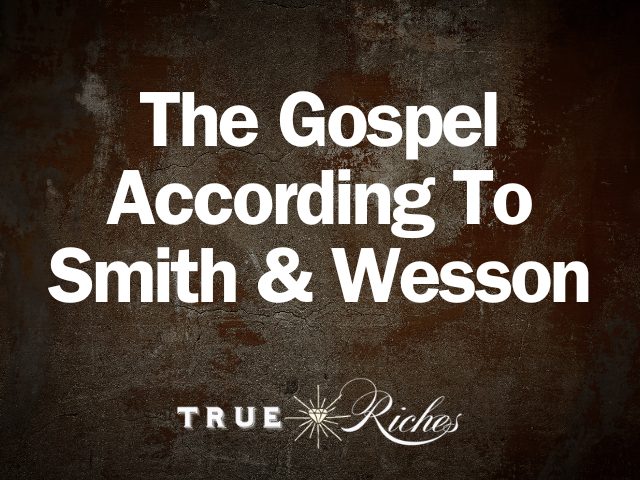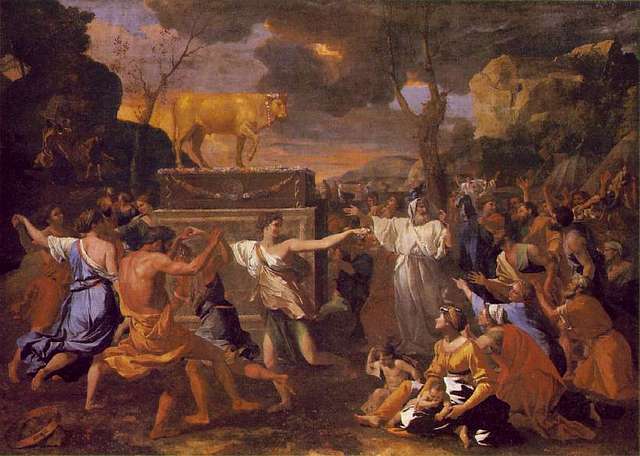Jesus didn’t carry a sword. Why do so many of His followers carry guns?

“They will beat their swords into plowshares and their spears into pruning hooks. Nation will not take up sword against nation, nor will they train for war anymore.”
— Isaiah 2:4
There’s a message echoing through many American churches today that didn’t come from Jesus.
It doesn’t teach forgiveness.
It doesn’t point to the cross.
And it certainly doesn’t lead us to love our enemies.
It promises freedom through firepower, peace through intimidation, and prioritizes rights over love.
It’s not the gospel of the kingdom.
It’s the gospel according to Smith & Wesson… where the Second Amendment is sacred, and Jesus has been recast as a gun-toting American patriot.
A Brief History of Gun Rights: From England to the American Frontier
The idea that people have a “God-given right to bear arms” didn’t start in the Bible. It didn’t come from the early church. It came from British law.
In 1689, after years of religious violence and political upheaval, England passed its Bill of Rights. One of its provisions gave Protestants (not all citizens) the right to bear arms “as allowed by law.” This wasn’t about individual freedom so much as maintaining power—specifically, protection against Catholic monarchs and state overreach.
This thinking crossed the Atlantic with the colonists. By the time the U.S. Constitution was drafted, confirmed fears of standing armies and government tyranny were front and center. So the Second Amendment was added, not specifically to guarantee personal firearms for every citizen, but to preserve local militias that could rise up in defense as needed.
Put simply: the Second Amendment was a legal solution to a political concern.
And let’s be clear: the founders weren’t quoting Jesus when they wrote the Second Amendment. They were responding to political fears, not pointing us to the cross. They may have believed God was on their side. Most of them probably did. But believing that doesn’t make it so.
There was plenty of religion in the air during the founding of this country. Church attendance was common. References to “divine providence” showed up in political speeches, letters, and courtrooms. Most people believed what they were doing was righteous. That’s never been in short supply.
But we have to ask: does the God revealed in Jesus extend a heavenly right to use carnal weapons (built only to kill) to the same disciples He commanded to love their enemies and not return evil for evil?
A knife can cut bread. A hammer can build a house.
But a handgun is designed for one purpose: homicidal violence.
It doesn’t build. It doesn’t repair. It doesn’t heal.
It’s designed to fire a bullet into a human body.
Are we to consider that a “gift” from the Father of Lights?
Let me be blunt: such carnal weapons are what Scripture calls “inventions of evil.”
So when we say gun rights are “God-given,” my contention is that we’re not just misreading history but also misrepresenting God. In other words, we’re assigning His name to something that bears no resemblance whatsoever to His life-giving character.
Gun Culture and the Rise of American Evangelicalism
By the 20th century, the gun had become more than a tool of war. It had become a symbol. For many Americans, guns stood for independence, self-reliance, and rugged morality (the kind of mythology that sells well in movies and political speeches.)
The Cold War only served to deepen that symbolism. With communism rising and fears of a nuclear event in the air, many white evangelicals began to link patriotism, capitalism, and Christianity into a single moral cause. The American way of life became not just politically good but divinely approved. And guns became part of that sacred identity.
During the 1950s and ’60s, language like “God-given rights” began to show up more frequently in political rhetoric, but especially in church pulpits. A wave of patriotic, “take America back for God,” sermons swept the country during the Eisenhower era and Constitutional rights were often held up like scripture. The Founding Fathers were treated like holy prophets. And the right to own a gun became, for many, a matter of faith.
Today, the legacy of that fusion is still with us more than ever.
Surveys show that white evangelicals are the religious group most likely to say the right to own a gun is essential to their freedom. They are also more likely than any other major religious group to oppose stricter gun laws, even in the face of repeated mass shootings.
Once something gets tied to your faith and your national identity, it’s not just hard to let go of… it even feels wrong to even question it.
That’s how sacred myths are born.
Fear, Control, and the Golden Calf
Fear has a way of revealing the truth about us.
We can say we trust God. We can quote scripture and sing the songs. But when fear hits us and when danger closes in, what we reach for first says more than our words ever could.
And that’s where the gun has taken root.
(VIDEO) Should Christians Carry Weapons?
For many believers today, the gun has become the first line of trust. It’s what we turn to when we’re afraid. It’s what makes us feel safe.
We might talk about God as our refuge, but the cold steel object tucked into a holster or resting beside the bed is what truly brings a sense of peace and safety.
After all, when our lives are endangered we turn to what we trust in most.
It’s easy to look back at the ancient Israelites melting down gold to form a golden calf in the Sinai wilderness and wonder how they could be so foolish. But do we not do the same thing?

They made a visible idol because they were scared and needed something they could touch and trust in. Something that made them feel in control. The rebellion of worshipping the golden calf was ultimately rooted in fear.
And fear is still building idols in the 21st century.
We rarely name them that way. We drape them in constitutional language or say they are “God-given.” But the idolatry is just as real.
“You shall have no other gods before me.”
— Exodus 20:3
Why did the earliest Christians, facing intense hostility, refuse to carry weapons? Were they naive? Or did they simply believe Jesus meant what He said?
I believe it’s the latter.
Trusting in God meant trusting even when it felt dangerous.
The gun may be deemed legal by the state. It may be a so-called “God-given” constitutional right to pack heat.
But if it’s what you turn to when you’re afraid then it may be far more than a tool. It may be an idol.
The Hidden History: Guns, Race, and the American Church
Despite what some may say, you can’t tell the story of guns in America without talking about race.
From the beginning of America’s history, access to firearms was less rooted in individual freedom and more about control. Enslaved people were one such group that were controlled with firearms. In the South, before and after the founding of the nation, white militias were formed to track, monitor, and intimidate Black communities. In colonial times, these groups were known as “slave patrols.” They were armed, organized, and in many cases, supported (or at least, tolerated) by local churches.
The Second Amendment wasn’t written in a vacuum. Part of its appeal, especially in Southern states, was its usefulness in preserving “order,” which often meant giving white citizens legal cover to remain armed against potential slave uprisings.
This history rarely shows up in the Sunday school version of America. But it’s in our laws. It’s in the Reconstruction mobs that burned down Black churches. It’s in the lynching photos where armed white Christians fill the crowd.
Even the wars we celebrate (think: the American Revolution, the Civil War) were soaked in Christian language. But beneath the surface, it was primarily Christians killing Christians. Churches on opposite sides. Pews divided by flags, states, and guns.
Let’s be clear: many American Christians have used their Bibles to bless their bullets.
The greatest sin may not have been what the Church said, but what it didn’t say.
The silence.
The excuses.
The comfort with injustice.
It still haunts us.
We’ve inherited more than we realize.
And until we’re willing to learn from this hidden history and understand its importance, not just in politics, but in discipleship, we’re likely to keep repeating the same mistakes, just dressed in new language.
“Blessed are the peacemakers, for they shall be called children of God.”
— Matthew 5:9
The Modern Fusion: God, Guns, and Lobbying
What began as a political concern has become a spiritual fusion.
Over time, guns have taken on a moral urgency. For many believers, defending the right to carry a gun feels like a sacred responsibility.
You hear it in the language:
“God-given rights.”
“Biblical self-defense.”
“Righteous resistance.”
Owning a gun becomes a sign of wisdom. Carrying one becomes a mark of responsibility. Questioning the Christian reliance upon guns has become suspect, even heretical, in many circles!
(VIDEO) Are Gun Rights “God-Given?” The “Christian” Roots of America’s Gun Culture
Churches have hosted concealed carry classes. Pastors have preached sermons defending the Second Amendment. We’ve heard of churches blessing firearms during services. Some congregations have raffled off AR-15 assault rifles as part of their outreach.
Somewhere along the way, the Good News of Jesus got tangled up within American gun culture. In reality, America’s “form of godliness” resembles a civil religion far more than the kingdom of God.
We mustn’t think that one person set out to create this fusion. Instead, it is a natural occurence when a culture is built on fear, and when that fear is baptized in religious language. In such an environment, it doesn’t take long before guns seem wise, and even necessary.
But it’s also far too easy to miss how strange this looks from the outside.
To someone unfamiliar with Jesus, it’s hard to tell whether Christians are more committed to the cross (i.e. laying down their life) or the right to bear arms (i.e. laying down someone else’s life).
When people look at the American Church, do they see Jesus?
The Theological Implications: A Gospel Distorted
What we believe about God’s character shapes how we live.
If we believe God gives us the right to take life, it changes how we treat people.
If we believe God wants us armed to defend ourselves, it changes how we see enemies.
If we believe God blesses violence in the name of freedom, it changes what we expect from the Church.
And over time, that kind of thinking changes how we interpret (and share) the gospel.
But the God revealed in Jesus doesn’t hand out swords and tell us to “stand our ground.”
He tells us to love our enemies.
He tells us to put the sword away.
He shows us that true power is self-giving love.
“Put your sword back in its place. For all who draw the sword will die by the sword.”
— Matthew 26:52
“My kingdom is not of this world. If it were, my servants would fight.”
— John 18:36
If the gospel we preach sounds more like a GOP political rally than the Sermon on the Mount, we’ve completely lost the plot.
The early Christians didn’t just seek to avoid violence but rejected it completely. They believed Jesus meant what He said. That the cross wasn’t just something Jesus did for us, but something we were meant to carry with Him.
When we baptize weapons and defend our “right to kill” by appealing to Jesus’ name, we’re not just straying from the gospel… we’re preaching another one altogether.
And it doesn’t look anything like Jesus.
A Better Witness
What if we chose a different path?
What if we stopped defending machines of death designed soley for homidical violence and instead chose to model the way of peace?
What if, in a world addicted to violence, we became a people who refused to kill because we follow a God who refused to kill?
That would be a witness to a gun-addicted nation.
Not a political one. A gospel one. Not a protest sign or a hashtag, but a living testimony to the upside-down Kingdom of God.
Because while the world clings to power through violence, we are called to follow a crucified Messiah who laid it down.
And while the culture tells us to protect what’s ours at all costs, Jesus tells us to lose our lives to find them.
Lest we forget…
“Blessed are the peacemakers, for they will be called children of God.”
— Matthew 5:9
Being a peacemaker in our violent world is not a sign of weakness. Instead, it’s a courageous refusal to perpetuate the cycle of fear and death.
The truth is, we don’t need more guns in the hands of Christians.
What we need are more Christians shaped by the cross.
The kind who love enemies.
The kind who beat swords into plowshares.
The kind who reveal what God is really like through a faithfulness to the example set forth by Christ.
This is the better way.
And it’s still possible.
It’s not too late.
We can start today.
Blessings,

Editor’s Note: This article is the second in our new six-part series at True Riches Academy entitled “The Cross and the Sword”, a provocative podcast and article series exploring guns, Christian nationalism, and the lost message of Jesus’ nonviolent love. Subscribe to our email list to follow the entire journey.
Have a thought or question? Please feel free to share it below.

